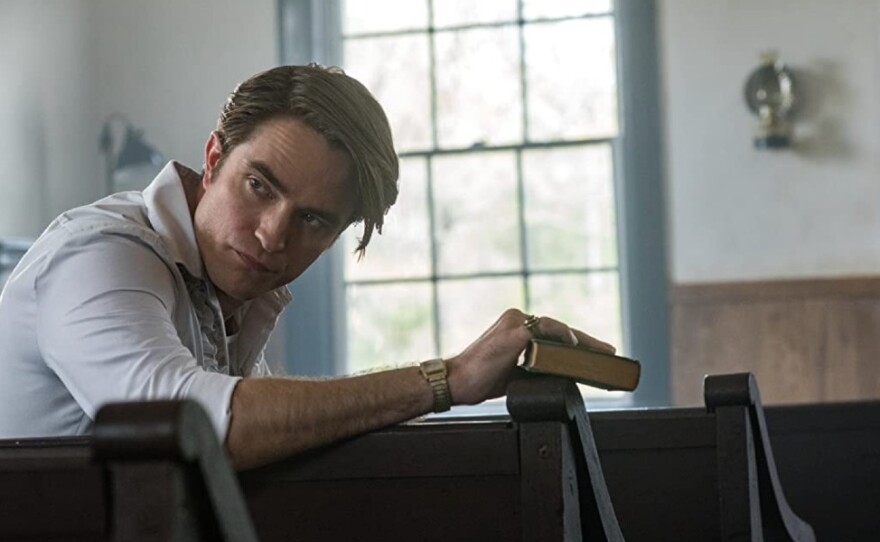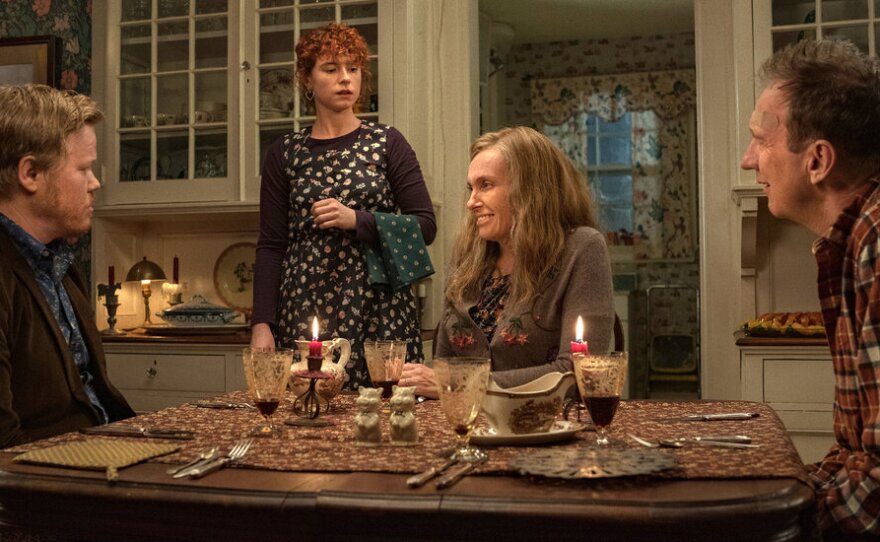With cinemas slowly opening but lacking much exciting fare to draw people out of quarantine, streaming services still offer some of the best — and some of the worst — movie options.
The Ridiculous: 'Antebellum'
Might as well start at the ridiculous end of the spectrum with "Antebellum" (available on-demand through Lionsgate). It's hard to tell what films are most anticipated with the pandemic and the election consuming a lot of our bandwidth but "Antebellum" did seem to have some buzz about it. It has the gorgeous Janelle Monáe as a contemporary writer who, as the trailer insinuated, gets taken back to a plantation in pre-Civil War America. The film uses William Faulkner's line, "The past is never dead," as kind of its starting point. And its poster brags its from the producers of "Get Out" and "Us." If only this film had any of the qualities of Faulkner or Jordan Peele (he's actually not one of this film's producers but Raymond Mansfield and Sean McKittrick, his producing partners on those previous films, are).
"Antebellum" may be one of the worst horror films I've endured this year. In fact, I was angry that I would never get those 105 minutes of my life back. Written and directed by Gerard Bush and Christopher Renz, the film thinks it's being clever but it just plays like a bad "Twilight Zone" episode.
It breaks down into three parts. Part one presents us with Monáe as Eden, a slave on a plantation. Then Eden falls asleep and Veronica (also Monáe) wakes up in the present day to a picture-perfect life. She has an adorable daughter, a perfect husband, a beautiful home, and is an author of buzz-worthy books. We suffer through what feels like an eternity with her girlfriends engaging in click-flick hijinks and banter before we enter part three where we discover the connection between Eden and Veronica.
So here are my key issues. Veronica has no character arc, she is presented as perfect from her hair and make-up to her family to her social consciousness. So her character has no real journey except that something bad happens to her. Frequently in horror films, a female protagonist is tested by something bad or grows and evolves through trauma (see the recent "Invisible Man" or "Ready or Not" for that kind of heroine). Then by breaking the film into three parts — none of which is well developed and the middle section deflating absolutely any sense of drama or tension — it fails to build any sense of terror or dread.
The idea of a contemporary Black woman being placed back in time to slavery is not a new concept and the fact that the film seems to think it invented the idea is just one example of its lack of awareness. Writer Octavia Butler explored this brilliantly in her novel "Kindred" while the African film "Sankofa" also looked to the legacy of the past weighing on the present. "Antebellum" thinks it's being clever because Veronica stays in the Jefferson suite at the hotel and there's a reference to Civil War re-enactments, but these are just references made without commentary and without enlightening audiences to why they should sting so sharply.
The filmmakers serve up all of the cliches we have already seen in movies about the horrors of slavery but with none of the current sense of awareness about how ingrained racism is in America. This film was conceived and shot well into the Trump presidency and had such a great opportunity to revisit the past with some fresh insights as we witness a president fueling hate and racist sentiments as a political strategy.
"Antebellum" is so aggravatingly disappointing because it misses such a great opportunity to use the horror genre for pointed social commentary. All I can say in favor of this film is that Monáe has an old school Hollywood glamor, now she just needs to find a director who knows what to do with that.

Between Ridiculous and sublime: Shudder's 'Spiral'
If "Antebellum" arrived with considerable buzz, I had heard nothing about Shudder's "Spiral" (not to be confused with the upcoming "Saw" spin-off of the same name). The film serves up a gay couple who have moved to a new upscale neighborhood with one of the men's daughters.
Aaron (Ari Cohen) adapts to the new environment without any problems but Malik (Jeffrey Bowyer-Chapman) has trouble adjusting. He also has to cope with horrific memories of anti-gay violence that took a former lover. Malik soon grows suspicious of his neighbors as strange things happen.
Directed by Kurtis David Harder and written by Colin Minihan and John Poliquin, "Spiral" delivers a solid horror tale that delivers familiar tropes with a slightly new spin. Malik's unstable emotional state renders his view of events as somewhat unreliable and the tension arises from the viewer trying to figure out what is real and what's not. The weaving in of the real-world horrors of homophobia help to give it a little more edge and social bite.
The ending, which is often where horror films fail, proves quite effective in terms of resolving the mystery and revealing the terror at the center of the story. It manages to be both decidedly dark yet with a hope for humanity. I was pleasantly surprised by the film.

'The Devil All the Time'
"The Devil All The Time" is packed with solid performances and a rich thematic exploration about religion, morality, and doing the right thing yet it ultimately failed to engage me. I think the problem for me was the voice-over narration that the film relies on to tell us the story.
Based on Donald Ray Pollock's novel and using Pollock as the film's narrator, the film weaves a story over decades and across multiple characters. There's a lascivious preacher, a tormented father, a serial-killing couple, a corrupt sheriff, and a young man trying to deal with a legacy of personal tragedy.
While there are some striking moments in the narrative, director Antonio Campos just doesn't seem to try that hard to give depth to the characters (who mainly feel like two-dimensional types) or weight to the themes. He seems to kick back and let Pollock tell us what to think and feel. Although not hitting on the same themes, the film made me want to go back and watch the series "Mindhunter" and the Korean film "I Saw the Devil."
"Mindhunter" for the way serial killers are dealt within a matter of fact yet utterly terrifying manner and "I Saw the Devil" for exploring the moral consequences of pursuing vengeance to the extreme (although the moral perspectives are very different between the these two "Devil" films).

Sublimely baffling: 'I'm Thinking Of Ending Things'
OMG! Where to begin with this new Charlie Kaufman film! I have to confess that I love his trippy, mind-bending work ("Being John Malkovich," "Adaptation," "The Eternal Sunshine of the Spotless Mind") and the fact that he doesn't hold your hand and explain everything. It is nice to sometimes be presented with a mystery or a puzzle box that you need to spend time with, maybe watch multiple times and then think about. In our fast food, instant gratification mentality it's nice to have something to savor and something that may perplex us a bit.
On the surface, the film is about Jake (Jesse Plemons) taking his girlfriend whose name might be Lucy or Amy or something else (Jessie Buckley) to visit his parents. They are taking a long drive in the cold slow so they have to pass a lot of time together. But once they arrive time seems to slip and slide and bend with Jake's parents appearing at different ages, Lucy's clothes changing, and something weird in the basement. The film has a certain horror vibe, along the lines of "Hereditary" but not that severe or disturbing and it also has an achingly bittersweet sense of longing.
But when it ends you may very well be scratching your head and wondering what it was all about. I'm not sure how much more to say and I'm not sure describing all that happens would even be giving spoilers because it still remains ambiguous as to what it all means.
It will help to be familiar with the musical "Oklahoma" especially the dream ballet; with Gena Rowlands' performance in John Cassavetes's "A Woman Under the Influence" and maybe Pauline Kael's review of it; and maybe with the ending of "A Beautiful Mind." But then don't take any of those things at face value. It is based on the book by Iain Reid but Kaufman rejects some key things from there so having read the book will clarify some things but not necessarily Kaufman's film.
Visually, Kaufman's film is mostly dark, bleak and cold. If you think about the films he has written and directed they are mostly darkly hued yet the creativity he endows them with is so audacious and brilliant that I always come away feeling inspired. This film is full of contrasts, hope sharply undercut by disappointment; fantasy versus reality but without a clear division between the two; and even different versions of people contrasting with themselves (we see the parents as various ages but out of sync with each other so the older mom is with the younger dad and vice versa).
The frustrating thing (and this is not entirely a bad thing) is that each time I felt I was kind of approaching some understanding, Kaufman would throw in one detail that totally disrupted what I was thinking. There is something that explains all this — sort of — but then it raises a whole other set of questions about how our minds and memory may work.
The performances are all great. I need to add that Toni Colette and David Thewlis play the parents, and all four performers are deft at leaving room for all sorts of interpretation while still giving us precise details about their characters. I'm not sure how Kaufman manages all this alchemy but I take delight in his work.
I suggest watching once without knowing much and then read Kaufman's interview on IndieWire where he explains a lot, and then watch it again. But I also suggest that whatever emotions or ideas you come away from the film with that you should embrace them no matter what Kaufman has to say. Part of what I love about the film is that things are open to interpretation and the best art should make you ponder things. I hope that all that I have said is enough to whet your appetite to see the film and then go find someone to have a long discussion with. That's really my idea of a great film, one that inspires you to think about it and one that you just want to see again so you can discuss all its possibilities.
I would also put in a good word for the series "Lovecraft Country" but I need to devote a separate review to that, but watch if you can and read the book as well as some actual Lovecraft stories in between episodes for a richer experience. And this actually does come from Jordan Peele.






